- Home
- William Bell
Crabbe Page 10
Crabbe Read online
Page 10
Although it had got lighter, the fog was still thick and the bush was ghostly grey, with the darker shapes of trees looming around us. It was impossible to find landmarks. I recognized nothing.
I was cheered up a little, though, when we met a creek, probably the same one we’d waded the day before.
“Mary, what do you think? Do you recognize this stream?”
“I - I guess so,” she answered weakly. She wasn’t even looking at the water when she said that.
I looked at her. The only sound was the purling of water over rocks and under logs. She was out of it, that was certain. I’d have to get us all the way back on my own.
Okay, I thought. No choice. So, do it.
I asked her if she was warm enough. It seemed to be getting colder as we breathed clouds that were absorbed into the fog. I got no answer from her. So I took out the pepper box, led Mary into the creek up to our knees, turned and dumped the rest of the pepper along the shore where we’d entered. Dropping the box in the water, I led Mary downstream for a hundred yards or so. When we left the stream I took a new bearing and led her into the eerie fog.
Over the next few hours a strong wind built up. The gusts tossed the naked branches of the hardwoods and drove away the heavy mist. I estimated it was around noon when the rain came back. By the time we entered the ridge country I knew two things.
First, we were on course. Mary’s compass had kept us on track.
Second, we were in deep trouble. The wind was bitter cold, with a nasty edge to it. The rain pelted us like bullets shot out of the gusts. Our clothes were wet through and we were in danger of hypothermia. To stop moving might mean allowing those maniacs to catch up with us. There was no telling how they would take revenge. If they were smart they’d stay in on a day like this. If the pepper worked the dog would be useless to them.
If. Lots of Ifs. Not sure what to do, I pushed on, deep into the rough country, climbing the first of the steep granite ridges. Once up on top I tried to catch sight of the pursuers but in that weather there was little visibility. I heard nothing but the howling wail of the wind, saw nothing through sheets of rain but grey sky, grey trees, grey rock.
Coming down off that first ridge was wicked. I don’t know if you’ve ever tried rock climbing. Going up is not too hard. Coming down is. You’re actually backing down, searching for hand and foot holds under and behind you. Doing it on rain-slicked granite is worse.
So once we were down safely and into a steep gulley tangled with fallen trees and scrub I took stock again. I decided to stop for the night. If we could get a fire going against the rock, out of the wind, we might be able to huddle together and keep warm, maybe even dry our clothes.
Who was going to chase us in this weather anyway? I thought. It’d be crazy. Those jerks were probably too hung over to move, let alone push through the bush in the black of night. And the flaming cook house should have kept them busy for a long time.
So I put the plan to Mary. Her eyes grew large with fright.
“No, no, no. Got to keep moving,” she groaned. She was barely making sense; just kept chanting, “No, can’t stop, can’t stop, no.”
What could I do? She was not sensible. She tried to head off on her own when I insisted we had to rest and dry out.
I should have tied her up. I should have done something to force her to stop. But I didn’t.
Crabbe’s Journal: 17
The wind had dropped and steadied by dark and the rain drizzled coldly. We scrambled and scratched over the rugged terrain, climbing and slipping. Mary began to make some sense and I began to hope that if we made it through the night we’d be okay.
One particular ridge would make a mountain goat worry, but we started up, compelled to push on. It went up steeply for maybe two stories. There were lots of hand and footholds alright -on a sunny day it would be a fun climb. But with numb, cold fingers and feet like frozen clubs, with twenty-four hours of travel behind you and a body half-dead, it was tough. We tore the flesh on our fingers and banged our knees a million times. The tedious hiss of rain on the rocks was broken by exhausted grunts of exertion.
Up we toiled, so slowly, unable to see the top until we were almost there. I got over the top first and turned to drag Mary the last few feet. We lay there, breathing heavily. Finally I sat up.
“We made it, Mary,” I said. “That’s the toughest climb finished. I remember. There’s only a couple of ridges left-easy ones-so we’re home free. Just a few hours from the lake. We’ll never be chased this far.”
“Let’s rest,” was all she said. But I took that as a good sign. She was over her panic. And she was back in touch with herself, enough to know she was tired out.
Turning our backs to the black pit we’d just climbed out of, we picked our way among the rocks and into a small stand of scrub oaks.
“I’m going to make a fire,” I said. “We’ll feel better if we can warm up a bit. You sit down.” I took Mary by the shoulders and pushed her onto a rock under one of the oaks.
Ten minutes later I coaxed a tiny, smoky orange flame from shreds of birch bark and fairly dry twigs. Once the fire had caught on I stood and said, “I’ll go hunt up some more wood.”
“I’ll help,” she said, rising unsteadily.
“No, no. You stay here. I can manage.”
“No, I could use the exercise,” she said and laughed weakly.
I was so happy and relieved to hear that laugh that I didn’t argue with her, just turned and walked a few yards into the black curtain of the bush and groped around in the dark for wood. When I came back a few minutes later the little fire was smoking and dying out so I had to work on it to nurse it back to the point where it would accept bigger sticks. I could hear only the snap of burning twigs, the hiss of rain on wet ground and rock and on the branches that gave only a little protection. The fire looked almost homey. I could feel a little warmth from it and began to think we’d really made it. We had survived. We would go back, get dry clothes, build the biggest damned bonfire ever, and crawl into our toasty, down sleeping bags. And sleep for days.
But I guess it doesn’t work that way.
After a few minutes I grew concerned that I couldn’t hear her. I called her name. No answer. Then again.
I retraced our steps. I fretted and ran around, growing more and more frantic. The brave little fire was forgotten and soon died. Around me were only the dark of the woods and the hiss of the rain.
I suppose all along I knew what had happened. After awhile I stopped looking and calling. And when the cold dawn leaked enough thin grey light into the landscape I set my jaw and forced myself to look over the edge of the steep rock we had worked so hard to conquer.
Mary was down there.
She lay on her back, twisted and broken by her fall to the jagged rocks on the valley floor.
I don’t want to spend a lot of time on this next part. I did what I had to do and that’s all there is to say about it.
The strange thing was, at that time I didn’t — couldn’t — cry. Numb and mechanical and calm, I was as empty of emotion as she was of life. I seemed to have complete presence of mind and, after a long time staring at her and building up the courage to climb down and do what was necessary, I carefully picked my way to the bottom.
I couldn’t take her back to civilization, that was obvious. And I couldn’t bury her in the rocky ground. Not even a rock grave would keep animals away for long. I spent all day gathering wood, carefully avoiding looking at her as I returned with each armload. The constant activity kept me warm and, since there was no rain, my clothing dried out a little. Dusk had arrived by the time I finished. The light breeze that blew all day had removed the clouds and dried the air. The first stars began to show when I lit the fire, using several starter fires with lots of birch bark and branches with the soggy bark stripped off.
As the last light faded I watched from the top of the ridge until I was certain the raging fire would not quit on me. By then it was dark. The stars
would give me enough light to travel by if I moved slowly. I took a bearing with the compass, said “Goodbye, Mary,” to the flames that crackled and raged, and turned and left the place. The roar of the inferno gradually faded behind me, and the leaping shadows seemed to show me the way to go.
Crabbe’s Journal: 18
The long walk to the lake was uneventful. It’s a little creepy, travelling alone in the bush at night, surrounded by varying shades of blackness. The night sounds are spooky and your own noises, even in a wet forest, seem loud. But I was too bone tired, damp, and cold to think about it. Besides, the last — what? — forty-eight hours had wrung all my emotions out of me. I just obeyed the compass, ignoring everything else.
When I reached the lake, I found the canoe easily. Soon I was back at the campsite. It seemed strange not to be greeted with a loud hello or a laugh as I pulled the boat out of the water and hid it out of habit in the usual place.
I’m ashamed to say, though, that I did not miss Mary. Though deserted and forlorn, that campsite meant only one thing to me then. I got a fire going quickly and soon had my damp clothing hung on sticks around it at a safe distance. Once in the tent, I stuffed one sleeping bag inside another and climbed inside. The warmth was unbelievable, flooding around me, dragging me to sleep.
I slept for at least two days, rising only to drink water and relieve myself. When I finally did emerge, dressed in the extra clothing that Mary always kept stored in the tent, it was mid-day, sunny and cold.
The first thing I thought of was food. There wasn’t much around the campsite — after all, that’s why we went on the raid in the first place — but I managed some strong Labrador tea and dried fish. I ate till I couldn’t pack away another molecule and, out of habit, took my last cup of tea down to the lake. Then I hit the sack again.
I guess my system was back on schedule because I awoke at dawn. After making up the fire, I made a trip to the bush and recovered one of Mary’s food caches. She had taken a variety of food-smoked fish, jerky, berries, tubers and stuff and packed it all into a bundle that would last her a month. After wrapping the bundle in plastic to waterproof it, she’d hang it in a tree at the edge of the campsite. I had helped her all summer and there were nine or ten of them around.
After breakfast I threw some pieces of fat, some jerky and a chopped up lily root into a little water in a pot and put the pot on a low fire. The stew would be for supper. I sat there for awhile, tending the fire, adding sticks until the water boiled, then banking the fire so as to give a steady, simmering heat.
And, do you know, I waited for them, but the tears wouldn’t come. I tried to cry, thought of all the good times we’d had, the things we’d done together, but nothing would come. There I was, dressed in her clothing, everything I was doing the result of her teaching, the fact that I was alive at all due to her courage, and I couldn’t even cry for her. Dry eyes were my thanks. I was disgusted with myself.
But then that was a stupid notion. I loved her. In fact, at that moment I felt that she was the only person I ever had loved. Maybe tears didn’t prove anything.
I began to think about Mary rather than the fact that she was dead. What did I know of her? Almost nothing. And yet everything I needed to know. Her approximate age. Her physical appearance. The play of many emotions across her strong, beautiful features. A little bit about her personality: she was the only female I knew who was a person to me.
Soon, as I thought about her, I remembered the canvas canoe pack she kept hidden in the bush. Would it give me answers to the million questions I asked myself every day? What was in her past? What was a beautiful, intelligent woman doing hiding in the bush for over a year? Who was she?
My curiosity soared again. I had to see that pack’s contents. I didn’t feel I’d be betraying her. There was no need for secrecy now. And that, strangely, was what did it. As soon as I thought that thought - that the campsite could be discovered now and it didn’t matter — the tears came.
And soon I was on my knees in the dirt, hunched over by the cheery little fire, wracked by deep, tearing sobs that came from way down inside me. When they say your heart breaks I know what they mean. Something had been torn away, leaving empty pain.
The sun was directly overhead in a cold sky by the time I found the pack under a big spruce tree that had a skirt so low it brushed the ground. The hiding place was pretty close to the campsite as I figured it would be. Having lugged the pack to the fireside, I left it alone while I checked the stew and made some tea. I filled the pipe and smoked for a bit.
Then I opened the pack, crying a little as I did so.
Over the next couple of days I pieced together what I could about Mary’s life before her escape. I had to use a lot of detective work on the letters, pictures, magazine and newspaper articles, documents and other stuff I found. There were many false starts too.
I want to tell this so it makes sense rather than just write down an inventory of the contents.
Mary was a university professor. She went to the University of Toronto, McMaster and Harvard, where she got a Doctor of Philosophy degree in History. Then she became an assistant prof. at Laurentian University. I read the published articles in the pack and I gather she was a left-winger and an environmentalist. She seemed to think society was sick (“out of touch with itself” was a phrase in one article). Society was like a living creature that had picked up an illness, so the organism had to throw lots of its resources into fighting the illness, and that threw the whole organism out of whack until either the organism died or the illness died. I didn’t understand the whole essay. There was lots of stuff in it about misusing the environment and wasting resources and so on. She didn’t say everything was wrong — I don’t mean that — but the wrong things had importance and the wrong people had control.
There were quite a few articles on historical questions, too. Pretty boring stuff. But she was one smart woman, I’ll tell you.
But she wasn’t cold smart. I’ve met a lot of smart people at different times and most of them seemed stand-offish, unemotional, as if when their brains grew they pushed all the feelings out of the way. And most of them seemed to think-that showing feeling was some kind of weakness. Most of the smart people my Father dragged home were boring snobs. He wanted me to be like that.
Mary wasn’t like that at all. She always seemed to know what I was feeling, and she cared about that. Oh, she didn’t treat me like glass or anything like that. Hell, sometimes she told me off and didn’t hold back. But she could do that because I knew she cared about me, not my clothes or my money, not my high marks at school or my father’s job or where I lived — me. I never met anyone who made me feel necessary. Not important: necessary. I mattered to her.
What I mean is, Mary was a tremendously wise, smart woman who didn’t come across like a dried up old intellectual.
Anyhow, to continue. Mary was married — I found some pictures of her husband: just an ordinary looking guy with a thin face and black hair and big, sad dark eyes. He worked at the same university doing research in Physics. She had a whole stack of his degrees too, along with a bunch of articles I couldn’t understand. But there was one little book he wrote, “No Nukes is Good Nukes,” which was a humorous attack on nuclear arms and had some serious questions about nuclear power stations. I guess he and Mary were activists. There were some buttons in the pack with slogans on them — anti-nuclear.
As I said, I pieced all this together over a couple of days, days that were hard on my emotions, full of crying fits and depression.
But one thing still threw me. I knew lots more about her, but I still didn’t know what the hell she was doing out in the middle of nowhere. Now the mystery was even greater. Why leave all that behind?
I went back through all the stuff, rereading everything more carefully — I had just skimmed it before. Gradually, the background was filled in. It was while I was flipping through a copy of a university quarterly that I found something new. A couple of newspaper clippi
ngs fell out from between the pages. I opened them- up, realizing that I hadn’t seen them the first time around.
PHYSICS PROFESSOR INJURED IN DEMONSTRATION
The report said that Mary’s husband, who was taking part in an anti-nuclear demonstration at the provincial government buildings, had been jostled from the crowded sidewalk into the path of a taxi. He had been seriously injured and rushed to a hospital.
The other article was written a couple of days later. It gave a follow-up on the march and mentioned in passing that the injured professor was on the critical list and doctors were afraid he would die. If he lived, he would be totally paralyzed and mentally deficient, since the injuries were to his head and spine. He was on life-support machines. The report ended with an opinion that if people would only stay home instead of taking part in “radical” protests, that sort of thing wouldn’t happen.
Well, I knew where he was, anyway. He must have died. I mean, a person like Mary certainly wouldn’t leave him in the hospital, plugged into the machines, and run off into the bush. Their old letters made it clear that they loved each other very much. (And, I’m ashamed to admit,.. I felt a little jealous about that.)
But all that still didn’t get me much farther ahead, did it? If he had died, why run away? She wasn’t on any holiday, that was for sure; she was hiding. It didn’t seem possible that she was a crook or a spy.
Finally, I gave up, totally frustrated. I’d invested a few rainy, cold, dreary autumn days in getting to know her past. I couldn’t see that I would find out anything more.
Methodically, because I knew she would want me to, I burned everything except the pack in my morning fire. It was a strange feeling. I was pretty upset, crying and sniffing all through, feeding the mementoes of two lives into the flames. Two important lives. Two decent people who loved each other, and certainly others, and were good at spreading their love around. He must have been like that. They lived their lives looking beyond themselves.

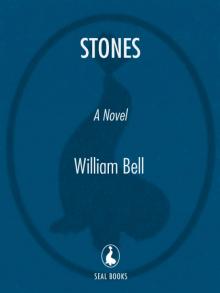 Stones
Stones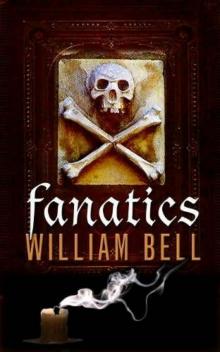 Fanatics
Fanatics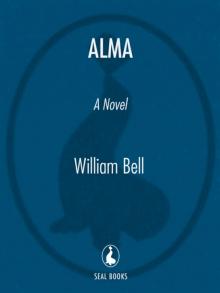 Alma
Alma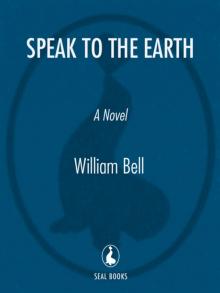 Speak to the Earth
Speak to the Earth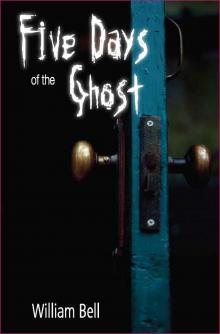 Five Days of the Ghost
Five Days of the Ghost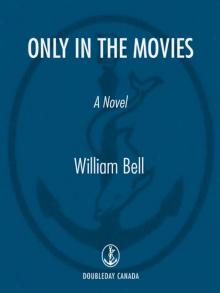 Only in the Movies
Only in the Movies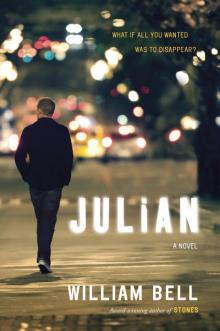 Julian
Julian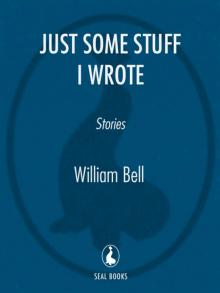 Just Some Stuff I Wrote
Just Some Stuff I Wrote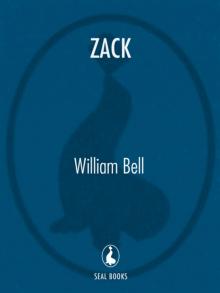 Zack
Zack Forbidden City
Forbidden City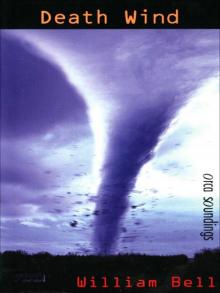 Death Wind
Death Wind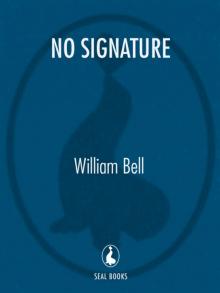 No Signature
No Signature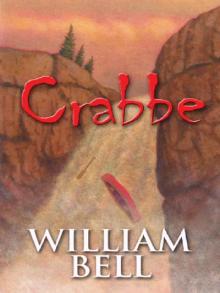 Crabbe
Crabbe